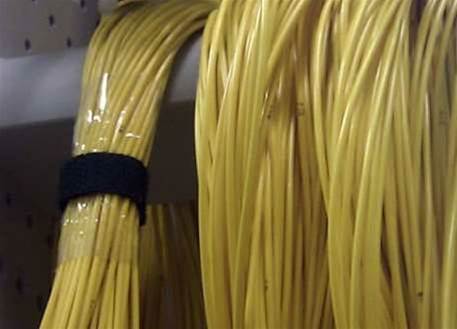Vocus Communications is crafting strategies to sell more capacity on its burgeoning capital city fibre network as it looks to grow utilisation from the current level of 5.6 percent.

The company, which specialises in fibre infrastructure and data centres, yesterday reported strong first half results for 2013, including a 316 percent increase in the number of fibre services compared to 1H12.
"It's really pleasing to see the fibre product get traction," CEO James Spenceley told iTnews. "We've only been in this business for 18 to 19 months."
Though fibre network utilisation is currently at 5.6 percent of in-ground capacity, services growth on the fibre is being masked by continued expansion of the network.
"I think as soon as the build phase stops, the utilisation just naturally grows because utilisation on a normalised basis is growing," Spenceley said.
"But we are putting a lot of focus into making sure that we do focus very much on selling the fibre we have rather than just continually building and spending CapEx [capital expenditure].
"We've got areas we want to target, areas where we know we get quotes and requests for fibre."
An investor slide deck (pdf) indicated Vocus plans to invest a further $11.76 million into building out fibre over the next year and half. It spent $15 million in the prior three half-year reporting periods.
"I wouldn't expect to see that [network utilisation] number jump up significantly in probably the next two halves because while we're increasing the utilisation, we're also rolling out new fibre," Spenceley said.
Data centre expansion
Vocus is focusing other CapEx on growing its data centre presence, including construction of a brand new facility in Collins Street, Melbourne, which is expected to have 105 racks ready for service by July.
The second half of financial year 2013 is anticipated as the most expensive in terms of CapEx commitment for the data centre expansion, coming in at $3.91 million, according to financial filings.
"Historically we've bought data centres and then added onto them, expanded them," Spenceley said.
"Collins Street is our first ground-up Vocus designed and built data centre so obviously there's a fair bit of CapEx coming with that."
Vocus is relishing greater control over the design of Collins Street.
"We're able to come out with all the experience we've had in data centres to date and really look at what is the most efficient way to build the data centre, what uses the least amount of power to deliver 1kW to a rack," Spenceley said.
He said that racks will be put straight onto the slab — dispensing with requirements for a traditional raised floor — and that the facility would also use hot-aisle containment and in-row cooling.
The financial results reveal existing data centre utilisation rates from 32 percent in Christchurch up to 98 percent in Perth and 100 percent in Melbourne.
"The highest utilisation of data centres [where we have not committed to a new facility] is Perth," Spenceley confirmed.
"I think we're narrowing down a number of sites there to expand and build another facility. That hasn't got capital approval yet, but certainly if we find the right site it'd be good to get some more capacity in that market.
"But equally it means that the data centre is operating at full performance, we're getting the best cash-flow return for shareholders."
IRU 'good deal'
The half-year results provide a financial insight into the deal that Vocus struck with the operators of the Southern Cross Cable last year.
Vocus' total remaining liability to Southern Cross is $54 million, effectively $5.21 million every half-year. This means the full liability will be met by August 2018, although the lease is actually for 13 years.
The firm's half-year report separately indicates that monthly payments increased only 24 percent compared to the previous lease, though Vocus had gained four times more capacity. (pdf)
"It's a pretty good deal," Spenceley said. "We're happy with it."
Buyout pot
Vocus has also secured a new financing facility that includes up to $13 million available to fund more acquisitions.
Spenceley acknowledges the company's success in acquisitive growth, though as it is still in the process of bedding down its last buy — Newcastle's Ipera Communications, which was made in December 2012 — it is in no particular hurry to open its chequebook again.
"Growing via acquisition is something we've done very well to date," he said.
"We're able to take an acquisition, apply our brand, apply some capital to it, and it's really like rocket fuel.
"It's certainly part of the strategy going forward that we'll make another acquisition but I don't think we're rushing to do one. We know our limitations in terms of integration and bedding them down."


_(28).jpg&h=140&w=231&c=1&s=0)
_(20).jpg&h=140&w=231&c=1&s=0)







 iTnews Executive Retreat - Security Leaders Edition
iTnews Executive Retreat - Security Leaders Edition
 iTnews Benchmark Awards 2026
iTnews Benchmark Awards 2026
 iTnews Cloud Covered Breakfast Summit
iTnews Cloud Covered Breakfast Summit
 The 2026 iAwards
The 2026 iAwards











_(1).jpg&h=140&w=231&c=1&s=0)



